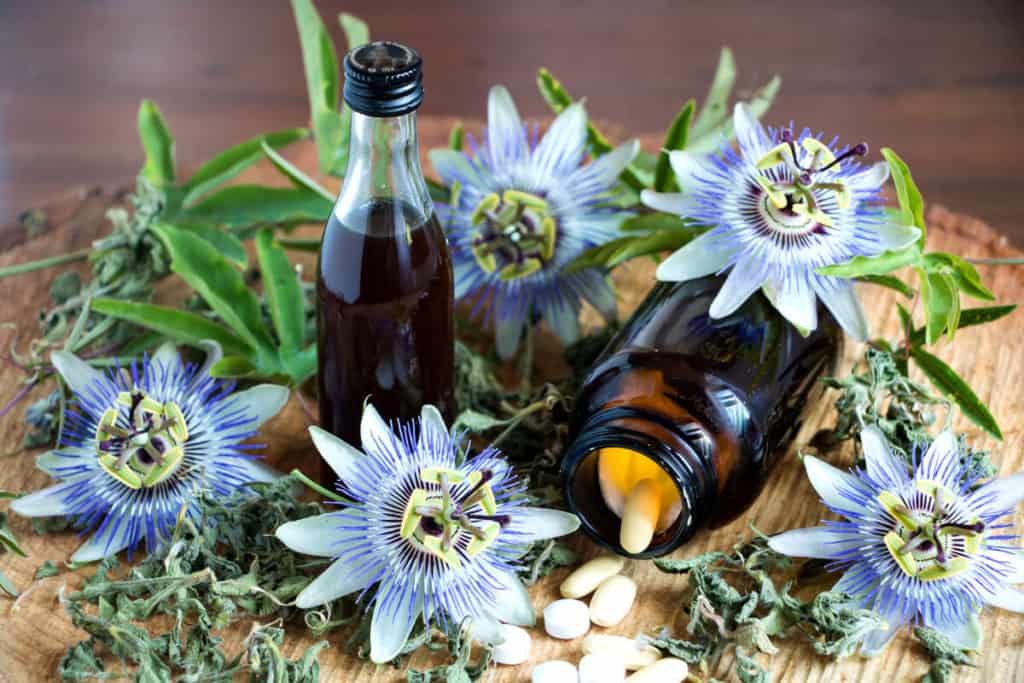- Changes in appetite
- Deep sadness
- Difficulty making decisions
- Fatigue
- Feelings of hopelessness
- Irritability
- Poor concentration
- Sleep problems (47)

Diet and mood: how food affects your mood
What you eat can have a significant impact on your mood. A growing number of studies link a diet filled with ultra-processed and high sugar foods with an increased risk of anxiety and depression. (1)(16)(25)(32) A diet that focuses on whole or minimally-processed foods, on the other hand, has been shown to support better mental health. (8)(29)Mood-boosting foods
Although a healthy diet can provide overall benefits, certain foods have been found to increase mood-boosting serotonin. (53) Others may provide omega-3 fatty acids or vitamin B12, which have been found to benefit those with depression or other mood disorders. (36)(40) The following foods have been found to be particularly helpful:- Beans (20)(26)
- Berries (15)
- Dark chocolate (37)(43)
- Fatty cold-water fish like salmon (13)(52)
- Nuts and seeds (9)
- Oatmeal (33)
Natural mood boosters
In addition to diet, your daily habits can also elevate your mood. Below, we highlight four lifestyle habits that can be incorporated into your day to help boost your mood.Physical exercise
There’s no denying that exercise is an important part of maintaining a healthy body, but it can also enhance your emotional well-being. Data shows that regular physical activity reduces the probability of developing depression. (12)(45) While research has focused primarily on the benefits of aerobic exercises, such as walking, running, spinning, yoga, or swimming, studies also show that anaerobic exercise such as weight lifting can help relieve stress, anxiety, and feelings of depression. (17)(38) The Centers for Disease Control and Prevention (CDC) recommends getting 150 minutes of moderate-intensity exercise each week. (19) That breaks down to just 30 minutes per day, five days per week. Try to include both aerobic and anaerobic exercise into your workouts each week. Download a handout on physical activity guidelines for various age groups.Did you know? Research suggests that people living with chronic stress are more likely to develop anxiety or major depressive disorder, (23) and women are at more risk than men for chronic stress, anxiety, and depression. (2)(11)(28)
Laughter
Laughter may truly be the best medicine. Researchers from Wayne State University report that laughter decreases stress hormones such as cortisol and epinephrine, while also activating the brain’s reward system. (42) Another study of 39 university students found that humor was at least as effective as exercise for improving mood and reducing anxiety. (46) Add some humor to your day by watching a funny movie, swapping jokes with friends, or looking around your neighborhood for humorous events. You can even follow your favorite comedian on YouTube.Mindfulness and meditation
Meditation has long been recognized as an effective way to improve symptoms of stress and anxiety by reducing cortisol levels. (48) Clinical trials show that even brief meditation sessions can enhance mood and improve the ability to process emotions. (4)(51) To get started, try using one of the many meditation apps available to download.
Self-reflection
Journaling is an excellent way to express your feelings and transfer some of your busy thoughts to pen and paper. It’s also a good vehicle for positive self-talk. Studies have found that daily journaling helps mitigate distressing thoughts and aids in changing the way you perceive stressful events. (44)(49)Mood-boosting supplements
Research demonstrates that L-theanine and a number of medicinal herbs, including ashwagandha, rhodiola, passionflower, and saffron, may provide beneficial effects on mood.Ashwagandha (Withania somnifera)
Ashwagandha is an adaptogenic herb historically used in Ayurvedic medicine to enhance well-being, support restful sleep, and reduce anxiety. In one double-blind, placebo-controlled study of 60 people with a history of chronic stress, those taking ashwagandha experienced a significant drop in stress and cortisol levels compared to those taking a placebo. (27) Ashwagandha can also improve anxiety, according to a study review conducted at SUNY Upstate Medical University. One of the studies evaluated in the review found that people taking ashwagandha experienced a 56.5% reduction in their anxiety compared to just 30.5% in those undergoing psychotherapy. Another study included in the review showed a 44% decrease in perceived stress in those taking ashwagandha compared to just 5.5% in those taking a placebo. (39)L-theanine
This amino acid, which is contained in the leaves of green tea, has been found to effectively relieve stress, enhance relaxation, and lower blood pressure. During one clinical trial, 12 participants were given either L-theanine, a placebo, or nothing before doing a mental arithmetic task. Those who took the L-theanine had a lower heart rate and a reduction in salivary immunoglobulin A (s-IgA), indicating a lower stress response. (24) In another randomized, placebo-controlled study of 34 people, those who took L-theanine an hour before a multitasking challenge felt considerably less stressed than those who took a placebo. (50)
Passionflower (Passiflora incarnata)
Used for centuries because of its calming and sedative properties, modern studies support the use of passionflower for addressing anxiety and insomnia. A randomized, placebo-controlled study published in the journal Anesthesia and Analgesia found that patients who took passionflower 90 minutes before surgery experienced less anxiety than those taking a placebo. (31) During another clinical trial, Australian scientists evaluated the effects of passionflower tea on a group of 41 volunteers suffering from insomnia. At the end of the study, those sipping the passionflower tea experienced significantly better sleep quality than those in the placebo group. (35)Rhodiola (Rhodiola rosea)
Numerous human clinical studies have demonstrated the effectiveness of rhodiola in reducing fatigue, while improving mood, attention, and cognitive function, particularly during times of stress. One recent clinical trial found that a daily dose of rhodiola reduced anxiety, irritability, tension, and a lack of joy in participants experiencing burnout. (21) In an earlier study published in the journal Phytotherapy Research, 101 volunteers with chronic stress were given supplemental rhodiola twice per day for four weeks. All the subjects experienced an improvement in symptoms of stress in as little as three days following rhodiola intake. (7) Another study examined the effectiveness of SHR-5, a standardized rhodiola extract, in alleviating mild to moderate depression when compared to a placebo. Results of the study concluded that 340 or 680 mg of SHR-5 per day over six weeks was effective in reducing symptoms of depression, emotional instability, insomnia, and somatization. (5)Did you know? Along with its mood-elevating benefits, rhodiola can also improve your exercise performance by reducing your perceived exertion during physical activity. (6)
Saffron (Crocus sativus)
Derived from the Crocus sativus flower, saffron may improve symptoms of anxiety and mild to moderate depression by increasing dopamine levels, preserving the amino acid gamma-Aminobutyric acid (GABA), and reducing cortisol. A meta-analysis of eight clinical trials found that saffron outperformed placebos and worked as effectively as the prescription drug fluoxetine to treat depression. (22) Another meta-analysis of 23 studies reported that saffron was more effective than a placebo in treating symptoms of both anxiety and depression. The researchers noted that saffron also improved the effectiveness of antidepressant medications. (30)St. John’s Wort (Hypericum perforatum)
An analysis of 35 clinical trials involving nearly 7,000 participants found that St. John’s wort reduced the symptoms of mild to moderate depression better than a placebo. St. John’s wort intake was also associated with fewer side effects than prescription medications used to treat the condition. (3) Studies suggest that this flowering plant may actually be just as effective as some antidepressant medications. In one six-week randomized, controlled, double-blind study of 251 people suffering from depression, researchers found that St. John’s wort reduced depression by 56.6%, compared to just 44.8% among those taking a selective serotonin reuptake inhibitor (SSRI). (47) Another study of 241 people who were assigned to take either St. John’s wort or an antidepressant reported that 68.6% of those taking the medicinal herb and 70.4% of those in the antidepressant group responded to treatment. (10)The bottom line
A healthy diet, lifestyle, and supplement regimen has been shown to help support a healthy mood. However, if you find that chronic anxiety or depression interferes with your daily life, speak to your healthcare professional about additional treatment options to restore calm and help foster a happier, healthier mood.- Adijbade, M., Julia, C., Allès, B., Touvier, M., Lemogne, C., Srour, B., Hercberg, S., Galan, P., Assmann, K.E., & Kesse-Guyot, E. (2019). Prospective association between ultra-processed food consumption and incident depressive symptoms in the French NutriNet-Santé cohort. BMC Medicine, 17, 78.
- Albert, P.R. (2015). Why is depression more prevalent in women? Journal of Psychiatry & Neuroscience, 40(4), 219-221.
- Apaydin, E.A., Maher, A.R., Shanman, R., Booth, M.S., Miles, J.N.V., Sorbero, M.E., & Helpel, S. (2016). A systematic review of St. John’s wort for major depressive disorder. Systematic Reviews, 5(1), 148.
- Basso, J.C., McHale, A., Ende, V., Oberlin, D.J., & Suzuki, W.A. (2019). Brief, daily meditation enhances attention, memory, mood, and emotional regulation in non-experienced meditators. Behavioural Brain Research, 356, 208-220.
- Darbinyan. V., Aslanyan, G., Amroyan, E., Gabrielyan, E., Malmström, C., & Panossian, A. (2007). Clinical trial of Rhodiola rosea L. extract SHR-5 in the treatment of mild to moderate depression. Nordic Journal of Psychiatry, 61(5), 343-348.
- Duncan, M.J. & Clarke, N.D. (2014). The effect of acute Rhodiola rosea ingestion on exercise heart rate, substrate utilisation, mood state, and perceptions of exertion, arousal, and pleasure/displeasure in active men. Journal of Sports Medicine, 2014, 563043.
- Edwards, D., Heufelder, A., & Zimmermann, A. (2012). Therapeutic effects and safety of Rhodiola rosea extract WS 1375 in subjects with life-stress symptoms—results of an open-label study. Phytotherapy Research, 26(8), 1220-1225.
- Francis, H.M., Stevenson, R.J., Chambers, J.R., Gupta, D., Newey, B., & Lim, C.K. (2019). A brief diet intervention can reduce symptoms of depression in young adults — A randomized controlled trial. PLoS ONE, 14(10), e0222768.
- Fresán, U., Bes-Rastrollo, M., Segovia-Siapco, G., Sanchez-Villegas, A., Lahortigua, F., de la Rosa, P.A., & Martínez-Gonzalez, M.A. (2019). Does the MIND diet decrease depression risk? A comparison with Mediterranean diet in the SUN cohort. European Journal of Nutrition, 58, 1271-1282.
- Gastpar, M., Singer, A., & Zeller, K. (2005). Efficacy and tolerability of hypericum extract STW3 in long-term treatment with a once-daily dosage in comparison with sertraline. Pharmacopsychiatry, 38(2), 78-86.
- Gender and stress. American Psychological Association. (2012). Retrieved from: https://www.apa.org/news/press/releases/stress/2010/gender-stress
- Giacobbi, P., Hausenblas, H., & Frye, N. (2005). A naturalistic assessment of the relationship between personality, daily life events, leisure-time exercise, and mood. Psychology of Sport and Exercise, 6(1), 67-81.
- Giles, G.E., Mahoney, C.R., & Kanarek R.B. (2013). Omega-3 fatty acids influence mood in healthy and depressed individuals. Nutrition Reviews, 71(11), 727-741.
- Global mental health: five key insights which emerge from the data. (2018). Retrieved from: https://ourworldindata.org/global-mental-health#note-4
- Godos, J., Castellano, S., Ray, S., Grosso, G., & Galvano, F. (2018). Dietary polyphenol intake and depression: Results from the Mediterranean Healthy Eating, Lifestyle and Aging (MEAL) Study. Molecules, 23(5), 999.
- Gómez-Donoso, C., Sánchez-Villegas, A., Martínez-González, M.A., Gea, A., de Deus Mendoça, R., Lahortiga-Ramos, F., & Bes-Rastrollo, M. (2020). Ultra-processed food consumption and the incidence of depression in a Mediterranean cohort: the SUN Project. European Journal of Nutrition, 59(3), 1093-1103.
- Gordon, B.R., McDowell, C.P., & Hallgren, M. (2018). Association of efficacy of resistance exercise training with depressive symptoms: meta-analysis and meta-regression analysis of randomized clinical trials. JAMA Psychiatry, 75(6), 566-576.
- Haskell-Ramsay, C.F., Jackson, P.A., Forster, J.S., Dodd, F.L., Bowerbank, S.L., & Kennedy, D.O. (2018). The acute effects of caffeinated black coffee on cognition and mood in healthy young and older adults. Nutrients, 10(10), 1386.
- How much physical activity do adults need? Center for Disease Control and Prevention. (2020). Retrieved from: https://www.cdc.gov/physical-activity-basics/guidelines/adults.html
- Kaplan, B.J., Crawford, S.G., Field, C.J., & Simpson, J.S. (2007). Vitamins, minerals, and mood. Psychological Bulletin, 133(5), 747-760.
- Kasper, S. & Dienel, A. (2017). Multicenter, open-label, exploratory clinical trial with Rhodiola rosea extract in patients suffering from burnout symptoms. Neuropsychiatric Disease and Treatment, 13, 889-898.
- Khaksarian, M., Behzadifar, M., Behzadifar, M., Alipour, M., Jahanpanah, F., Re, T.S., Firezuoli, F., Zerbetto, R., & Bragazzi, N.L. (2019). The efficacy of Crocus sativus (Saffron) versus placebo and Fluoxetine in treating depression: a systematic review and meta-analysis. Psychology Research and Behavior Management, 12, 297–305.
- Khan, S. & Khan, R.A. (2017). Chronic stress leads to anxiety and depression. Annals of Psychiatry and Mental Health, 5(1), 1091.
- Kimura, K., Ozeki M., Juneja, L.R., & Ohira, H. (2007). L-theanine reduces psychological and physiological stress responses. Biological Psychology, 74(1), 39-45.
- Knüppel, A., Shipley, M.J., Llewellyn, C.H., & Brunner, E.J. (2017). Sugar intake from sweet food and beverages, common mental disorder and depression: prospective findings from the Whitehall II study. Scientific Reports, 7, 6287.
- Lachance, L. & Ramsey, D. (2015). Food, mood, and brain health: implications for the modern clinician. Missouri Medicine, 112(2), 111-115.
- Lopresti, A.L., Smith, S.J., Malvi, H., & Kodgule, R. (2019). An investigation into the stress-relieving and pharmacological actions of an ashwagandha (Withania somnifera) extract: A randomized, double-blind, placebo-controlled study. Medicine (Baltimore), 98(37), e17186.
- McLean, C.P., Asnaani, A., Litz, B.T., & Hofmann, S.G. (2011). Gender differences in anxiety disorders: prevalence, course of illness, comorbidity, and burden of illness. Journal of Psychiatry Research, 45(8), 1027-1035.
- McMillan, L., Owen, L., Kras, M., & Scholey, A. (2011). Appetite, 56(1), 143-147.
- Marx, W., Lane, M., Rocks, T., Ruusunen, A., Loughman, A., Lopreti, A., Marshall, S., Berk, M., Jacka, F., and Dean, O.M. (2019). Effect of saffron supplementation on symptoms of depression and anxiety: a systematic review and meta-analysis. Nutrition Reviews, nuz023.
- Movafegh, A., Alizadeh, R., Hajimohamadi, F., Esfehani, F., & Nejatfar, M. (2008). Preoperative oral Passiflora incarnata reduces anxiety in ambulatory surgery patients: a double-blind, placebo-controlled study. Anesthesia and Analgesia. 106(6), 1728-1732.
- Murphy, M. & Mercer, J.G. (2013). Diet-regulated anxiety. International Journal of Endocrinology, 2013, 701967.
- Nabb, S.L. & Benton, D. (2006). The effect of the interaction between glucose tolerance and breakfasts varying in carbohydrates and fibre on mood and cognition. Nutritional Neuroscience, 9(3), 161-168.
- National Institute of Mental Health. (2018). Depression. http://www.nih.gov/health/topics/depression/index.shtml
- Ngan A & Conduit R. (2011). A double-blind, placebo-controlled investigation of the effects of Passiflora incarnate (passionflower) herbal tea on subjective sleep quality. Phytotherapy Research, 25(8):1153-1159.
- Osher, Y. & Blemaker, R.H. (2009). Omega-3 fatty acids in depression: a review of three studies. CNS Neuroscience & Therapeutics, 15(2), 1218-133.
- Parker, G., Parker, I., & Brotchie, H. (2006). Mood state effects of chocolate. Journal of Affective Disorders, 92(2-3), 149-159.
- Peluso, M. & Guerra de Andrade, L. (2005). Physical activity and mental health: the association between exercise and mood. Clinics, 60(1), 1807-5932.
- Pratte, M.A., Nanavati, K.B., Young, V., & Morley, C.P. (2014). An alternative treatment for anxiety: a systematic review of human trial results reported for the Ayurvedic herb ashwagandha (Withania somnifera). Journal of Alternative and Complementary Medicine, 20(12), 901-908.
- Rathod, R., Kalee, A., & Joshi, S. (2016). Novel insights into the effect of vitamin B12 and omega-3 fatty acids on brain function. Journal of Biomedical Science, 23, 17.
- Revadigar, N. & Gupta, V. (2020). Substance induced mood disorders. NCBI Bookshelf. https://www.ncbi.nlm.nih.gov/books/NBK555887/
- Savage, B.M., Lujan, H.L., Rhipparthi, R.R., & DiCarlo, S.E. (2017). Humor, laughter, learning, and health! A brief review. Advanced Physiological Education, 41, 341-347.
- Scholey, A. & Owen, L. (2013). Effects of chocolate on cognitive function and mood: a systematic review. Nutrition Reviews, 71(10), 665-681.
- Smyth, J.M., Johnson, J.A., Auer, B.J., Lehman, E., Talmo, G., & Sciamanna, C.N. (2018). Online positive affect journaling in th improvement of mental distress and well-being in general medical patients with elevated anxiety symptoms: a preliminary randomized controlled trial. JMIR Mental Health, 5(4), e11290.
- Stathopoulou, G., Powers, M., Berry, A., Smits, J., & Otto, M. (2006). Exercise interventions for mental health: a quantitative and qualitative review. Clinical Psychology Science & Practice, 13, 179-193.
- Szabo, A. (2003). The acute effects of humor and exercise on mood and anxiety. Journal of Leisure Research, 35(2), 152-162.
- Szegedi, A., Kohnen, R., Dienel, A., & Kieser, M. (2005). Acute treatment of moderate to severe depression with hypericum extract WS 5570 (St. John’s wort): randomised controlled double blind non-inferiority trial versus paroxetine. BMJ, 330(7490), 503.
- Turakitwanakan, W., Mekseepralard, C., & Busarakumtragul, P. (2013). Effects of mindfulness meditation on serum cortisol of medical students. Journal of the Medical Association of Thailand, 96(Supp 1), S90-S95.
- Ullrich, P.M. & Lutgendorf, S.K. (2002). Annals of Behavioral Medicine, 24(3), 244-250.
- White, D.J., de Klerk, S., Woods, W., Gondalia, S., Noonan, C., & Scholey, A.B. (2016). Anti-stress, behavioural and magnetoenchalography effects of an l-theanine-based nutrient drink: a randomized, double-blind, placebo-controlled, crossover trial. Nutrients, 8, 53.
- Wu, R., Liu, L., Zhu, H., Su, W., Cao, Z., Zhong, S., Liu, X., & Jiang, C. (2019). Brief mindfulness meditation improves emotion processing. Frontiers in Neuroscience, 13, 1074.
- Yang, Y., Kim, U., & Je, Y. (2018). Fish consumption and risk of depression: Epidemiological evidence from prospective studies. Asia Pacific Psychiatry. 10(4), e12335.
- Young, S.N. (2007). How to increase serotonin in the human brain without drugs. Journal of Psychiatry and Neuroscience, 32(6), 394-399.





